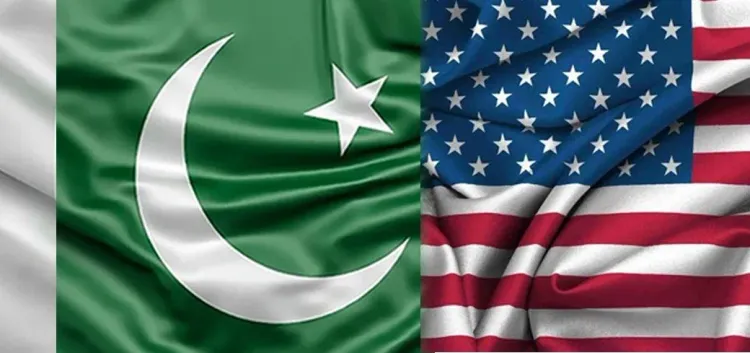Will Trump's Pakistan Policy Cause Geopolitical Turmoil?

Synopsis
Key Takeaways
- Trump's agreement for oil development in Pakistan may lead to geopolitical turbulence.
- Pakistan's oil reserves are limited, raising questions about the viability of this partnership.
- Balochistan's unrest could complicate US involvement in resource extraction.
- The US must consider the implications for US-India relations.
- Understanding Pakistan's strategic culture is crucial for effective diplomacy.
New Delhi, Aug 11 (NationPress) US President Donald Trump has introduced a new agreement aimed at the collaborative development of Pakistan's oil reserves, branding it as a "significant starting point" for a long-term energy collaboration. However, this venture may ultimately see the US engage in a partnership that produces minimal energy, weak loyalty, and substantial geopolitical upheaval, as pointed out in an article on 'Directus', an online publication from Greece.
The announcement regarding US foreign policy, communicated through Trump's Truth Social platform, was followed by a wider trade agreement and a reduction in tariffs on Pakistani imports from 29% to 19%. At first glance, this could be perceived as a sensible strategy to enhance economic ties and counter China's increasing dominance in South Asia. But, as the Athens-based article suggests, beneath the surface lies a concerning strategic error.
The article notes that Trump's excitement about Pakistan's "vast" oil reserves is curious, given that the nation's crude oil reserves are estimated to be only 234 to 353 million barrels, ranking it around 50th worldwide. Pakistan relies on imports to satisfy its oil requirements, including oil sourced from the US.
Even if oil extraction succeeds, especially in Balochistan, where reserves are thought to exist, the ramifications could be destabilizing. Balochistan has historically been a hotspot of ethnic and political unrest, worsened by perceptions of foreign exploitation. China's significant presence in the region via the China-Pakistan Economic Corridor (CPEC) has already sparked discontent. US participation in resource extraction could further alienate local communities and entangle Washington in a volatile domestic conflict, as the article highlights.
Balochistan holds strategic significance for Washington as a potential observation point to monitor Iranian activities. However, using the province for geopolitical leverage could exacerbate tensions in a region already rife with anti-Western sentiment.
The article indicates that Pakistan Army Chief Asim Munir's visit to Washington might seem complimentary, but it symbolizes a troubling trend - Washington's reactive shift towards Islamabad, seemingly fueled by frustration with New Delhi's assertive stance.
India's strong position in trade discussions, particularly its refusal to accept Trump's proposed trade deal, has evidently unsettled Washington. This is compounded by India's considerable and unapologetic purchase of Russian oil, challenging Western expectations and signaling a fiercely independent energy strategy. Consequently, the US appears to be rekindling relations with Pakistan, a nation whose aid was recently reduced by the same administration now courting it. However, this renewed friendliness is not based on strategic foresight; it is a knee-jerk response, an attempt to revive the outdated India-versus-Pakistan narrative to pressure New Delhi into compliance, which is both outdated and dangerously shortsighted.
India is not just a regional counterweight to China; it is a long-term strategic ally for the US. The two countries share extensive and growing cooperation across vital sectors - advanced technology, clean energy, higher education, and defense. American and Indian private sectors are increasingly interconnected, with strong business-to-business ties and joint ventures spanning from Silicon Valley to Bengaluru. Defense agreements between the two countries have reached unprecedented levels, reflecting mutual trust and shared security interests. Sacrificing this multifaceted partnership for short-term leverage over trade or oil diplomacy with Pakistan risks undermining strategic depth for tactical maneuvers.
The article also underscores that Pakistan is an inconsistent ally due to its dual-track diplomatic strategy, which allows the nation to extract advantages from both Beijing and Washington without fully committing to either side. Any US effort to lessen Pakistan's reliance on China must contend with this deeply rooted strategic culture. Pakistan will continue to navigate both sides, leveraging American technology and markets while welcoming Chinese infrastructure and investment.
Islamabad has long been adept at strategic hedging, aligning opportunistically with global powers as priorities shift. During the Soviet invasion of Afghanistan, Pakistan was an essential ally for America. When China initiated its Belt and Road Initiative, Pakistan emerged as its flagship partner. Pakistani forces have cooperated with the West in counter-terrorism efforts, and when China required maritime access, Gwadar Port was made available.
The Trump-led oil agreement may be presented as a bold move towards energy collaboration, but it risks becoming another episode in a lengthy history of American miscalculations in South Asia. The economic justification is weak, the geopolitical dangers are high, and the strategic rewards are uncertain. If Washington genuinely aims to counter China's influence and stabilize the region, it must look beyond transactional agreements and grasp the deeper dynamics shaping Pakistan's foreign policy.









